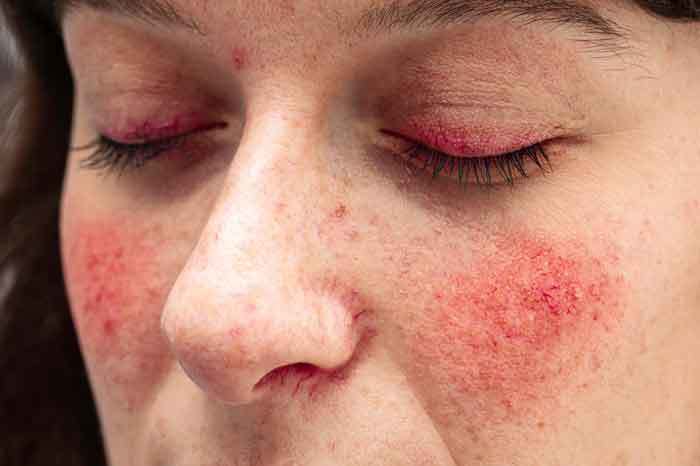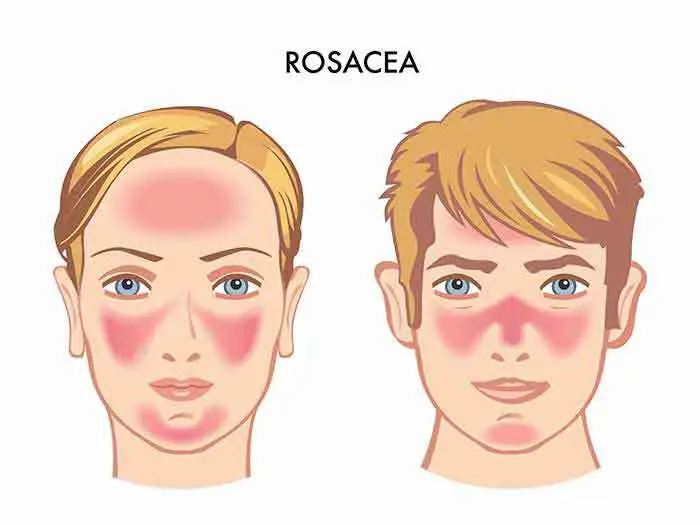Does Rosacea Cause Dry Skin? – What to look out for!

“I’m well past puberty,” you tell yourself, “so why do I still have this pesky acne on my face?”
Have you visited countless numbers of cosmetic stores? Bought hundreds of topical creams? Maybe even tried those “all-natural” remedies that involve putting three or more types of oils on your face?
If you’ve done all these things and more, then chances are, it’s not acne that’s compromising your beautiful visage, but rosacea.
Read on to find out the signs and symptoms of rosacea, whether or not you may be suffering from it, and whether rosacea does cause dry skin.
More...
How do I spot rosacea?
The first factor of rosacea that probably led you to believe you’ve got post-puberty acne is that it looks like acne.
Those red spots on your face that you thought were acne scars leftover from your high school years?
Yup, it’s rosacea.
They can also come in the form of pus-filled bumps on your face, or a constant blush over the central part of your face.

Here are some more specific signs to look out for if you’re worried about having rosacea:
Your face may even be drier than usual, which is definitely a pain to deal with.
Is it due to rosacea, and do you think you could prevent it?
What’s causing my rosacea?
Rosacea is often passed down (thanks, mom and dad!). But, a number of things you do or are exposed to can also cause flare-ups.
These are the periods in which your symptoms show up.
That’s right, just like any other ailment, there are periods in which your symptoms can go away.
Before you can breathe a sigh of relief, though, know that they’ll come back, sure enough.
After all, there’s no known cure for rosacea just yet. But in the meantime, what you can do are things that will help temper your symptoms.
So, what are the things you’re doing that you should avoid in order to delay your next flare-up, and avoid this dry, flaky skin?
What to avoid if you have rosacea?
Here are some of the things to look out for:

You should also know the factors that make you more likely to suffer from rosacea.
Yep, it’s not all just lifestyle choices, but even some factors that are completely out of your control.
We know, we know, it’s unfair, but it’s just the way it is.
So if you place a check mark besides any of the following, then probably, your never-ending acne cycle is, in fact, rosacea.
How to Control Rosacea?
So you’ve established that you have rosacea, but knowing that there’s no cure, is there a way to control it?
Thankfully, yes.
(We explain more about it here)
The most important thing you should do is of course, to be careful in choosing the products to buy for your skin.
First, find out whether you have dry, oily, or normal skin. This is because buying the wrong type for your face is sure to trigger a flare-up!
As you’re extra sensitive, even just a small breeze of dry air is sure to dry out your skin! So choose carefully in moisturizers.
Does Rosacea Cause Dry Skin?
So, does rosacea cause dry skin?
Yes, that’s right, rosacea isn’t exactly causing your dry, cracked skin! However, your bad handling will!
That’s why it’s important to avoid extreme temperatures.
Because there’s really no cure for rosacea, you should consult with your doctor, who will give you a regimen of products that are sure to be safe for you to put on your skin.
It may seem like so much work, and definitely you’ll just wish that you had normal, average acne instead.
Even just knowing what it is that’s making your face so red and dry all the time is a good enough start.
Remember, if you’re in between ages 30 to 50, have fair skin, and are suffering from a redness on your skin that’s tender and even dry all the time, then chances are, it’s rosacea!
